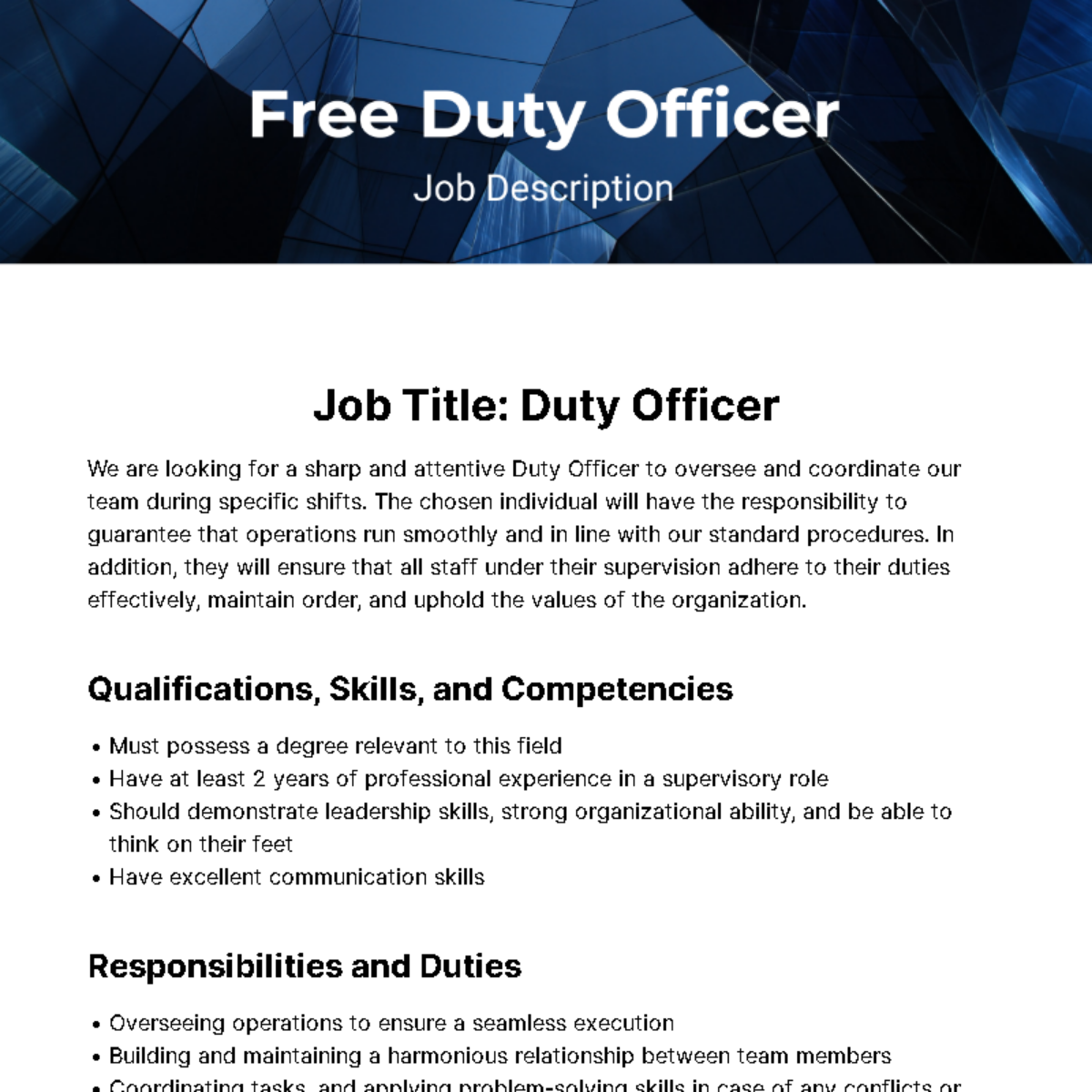Hey there, ever wondered who keeps the gears turning when the chips are down? Yeah, we're talking about the officer on duty. This role is like the unsung hero of any organization, ensuring everything runs smoothly while handling emergencies with precision. So, buckle up, because we’re diving deep into what it means to be an officer on duty and why they’re so crucial in today’s fast-paced world. And trust me, this isn’t just another boring job description!
Being an officer on duty isn’t all about sitting in a chair and waiting for something to happen. Nope, it’s a high-stakes position that requires a mix of skills, knowledge, and adaptability. Whether it’s managing a team during a crisis or ensuring routine operations stay on track, the officer on duty is the go-to person for all things operational. Stick around as we break down the ins and outs of this vital role!
Now, before we dive deeper, let’s address the elephant in the room: why should you care? Well, if you’re thinking of pursuing a career in operations management or simply want to understand how organizations function behind the scenes, this article is for you. We’ll explore everything from responsibilities to challenges, and even share some tips for excelling in this demanding yet rewarding role. So, let’s get started!
Read also:Emily Carriveau Divorce Understanding The Legal And Emotional Aspects
Who Is an Officer on Duty?
An officer on duty, or OOD for short, is the person responsible for overseeing operations during a specific shift or period. Think of them as the conductor of an orchestra, ensuring every instrument plays in harmony. The OOD plays a critical role in maintaining order, addressing issues promptly, and making decisions that can impact the entire organization. But don’t let the title fool you; this isn’t just about wearing a badge and calling the shots.
The role of an officer on duty varies depending on the industry, but the core responsibilities remain the same: ensuring safety, maintaining communication, and executing tasks efficiently. Whether it’s in law enforcement, healthcare, or corporate settings, the OOD is the backbone of operational success. They’re the ones who keep things running smoothly, even when the unexpected happens.
Key Responsibilities of an Officer on Duty
Alright, so what exactly does an officer on duty do? Let’s break it down. The responsibilities of an OOD can be categorized into three main areas: coordination, communication, and crisis management. Here’s a quick rundown:
- Coordination: The OOD ensures that all departments are aligned and working towards common goals. This includes assigning tasks, monitoring progress, and addressing any bottlenecks.
- Communication: Effective communication is key. The OOD acts as a bridge between different teams, ensuring that information flows seamlessly and everyone is on the same page.
- Crisis Management: When things go south, the OOD is the first responder. They assess the situation, implement contingency plans, and ensure that the organization remains stable.
But wait, there’s more! The officer on duty also handles routine tasks like reporting, documentation, and supervision. It’s a demanding role that requires a balance of leadership, technical expertise, and emotional intelligence. And let’s not forget, the OOD is often the first point of contact for external stakeholders, making their role even more critical.
What Skills Does an Officer on Duty Need?
Being an officer on duty isn’t for the faint-hearted. It requires a unique set of skills that go beyond basic management abilities. Here are some key skills that every OOD should possess:
- Leadership: The ability to lead by example and inspire others is crucial. An OOD must be able to motivate their team and foster a positive work environment.
- Decision-Making: Quick thinking and sound judgment are essential. The OOD must be able to make informed decisions under pressure.
- Problem-Solving: Whether it’s a technical issue or a personnel conflict, the OOD must be adept at finding solutions.
- Communication: Clear and concise communication is a must. The OOD should be able to convey information effectively to all levels of the organization.
And let’s not forget the importance of emotional intelligence. An OOD must be able to read the room, understand the needs of their team, and respond appropriately. It’s not just about getting the job done; it’s about doing it with empathy and understanding.
Read also:Socially Keeda Subhashree A Comprehensive Guide To Her Life Work And Achievements
Challenges Faced by Officers on Duty
Let’s be real, being an officer on duty isn’t all sunshine and rainbows. There are challenges that come with the territory. One of the biggest hurdles is dealing with unexpected situations. Whether it’s a sudden power outage, a security breach, or a medical emergency, the OOD must be prepared to handle anything that comes their way.
Another challenge is managing a diverse team. Not everyone works at the same pace or has the same level of experience. The OOD must be able to adapt their leadership style to suit different personalities and skill sets. And let’s not forget the pressure of accountability. The OOD is often the one held responsible for any mistakes or oversights, which can be a heavy burden to bear.
How to Overcome These Challenges
So, how do officers on duty rise to the occasion? It all comes down to preparation and training. Here are some strategies that can help:
- Continuous Learning: Staying up-to-date with industry trends and best practices is crucial. The OOD should regularly attend workshops, seminars, and training sessions to enhance their skills.
- Team Building: Fostering a strong team dynamic can make a world of difference. Encourage collaboration, open communication, and mutual respect among team members.
- Contingency Planning: Having a plan B (and C) in place can help mitigate the impact of unexpected events. The OOD should work closely with other departments to develop robust contingency plans.
And let’s not underestimate the power of feedback. Encouraging open dialogue and constructive criticism can help the OOD identify areas for improvement and make necessary adjustments.
The Importance of Officer on Duty in Various Industries
Now that we’ve covered the basics, let’s talk about how the role of an officer on duty varies across industries. Whether it’s in law enforcement, healthcare, or corporate settings, the OOD plays a vital role in ensuring operational efficiency.
Law Enforcement
In law enforcement, the officer on duty is responsible for maintaining public safety and order. They oversee patrol officers, respond to emergencies, and coordinate with other agencies as needed. The role requires a strong understanding of legal procedures and a commitment to serving the community.
Healthcare
In healthcare, the officer on duty ensures that patient care remains a top priority. They oversee staff, manage resources, and address any issues that arise during their shift. The role demands a deep understanding of medical protocols and a focus on patient safety.
Corporate Settings
In corporate settings, the officer on duty is often responsible for overseeing operations, ensuring compliance with regulations, and managing risks. They work closely with other departments to ensure that the organization runs smoothly and efficiently.
Tips for Excelling as an Officer on Duty
So, you’re thinking of becoming an officer on duty? Great choice! But how do you excel in this demanding role? Here are some tips to help you succeed:
- Stay Organized: Keep a detailed schedule and prioritize tasks to ensure nothing falls through the cracks.
- Build Relationships: Foster strong relationships with team members, stakeholders, and external partners. Networking can open doors and provide valuable support.
- Stay Calm Under Pressure: When the going gets tough, the tough get going. Practice stress management techniques to keep your cool during high-pressure situations.
And remember, continuous improvement is key. Seek feedback, learn from your experiences, and never stop growing. The more you invest in your role, the more rewarding it will be.
Conclusion
Well, there you have it – the lowdown on being an officer on duty. From coordinating operations to managing crises, the OOD plays a vital role in ensuring organizational success. Whether you’re considering a career in this field or simply want to understand the dynamics behind the scenes, we hope this article has provided valuable insights.
So, what’s next? If you found this article helpful, don’t forget to share it with your friends and colleagues. And if you have any questions or comments, we’d love to hear from you. Who knows, your feedback might inspire our next article!
Table of Contents
- Who Is an Officer on Duty?
- Key Responsibilities of an Officer on Duty
- What Skills Does an Officer on Duty Need?
- Challenges Faced by Officers on Duty
- How to Overcome These Challenges
- The Importance of Officer on Duty in Various Industries
- Law Enforcement
- Healthcare
- Corporate Settings
- Tips for Excelling as an Officer on Duty


